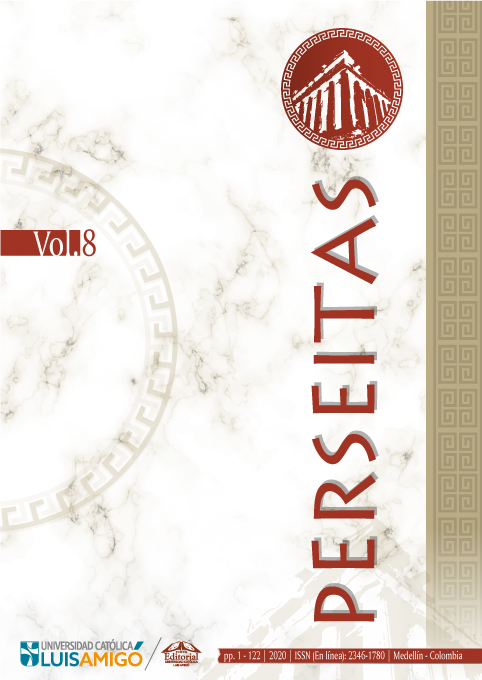Descartes and Nietzsche: perspectives about the body
DOI:
https://doi.org/10.21501/23461780.3670Keywords:
Reason, Experience, God, Man, Truth, Life, Soul, BodyAbstract
This article traces the conceptions of the body in the approaches of the French philosopher René Descartes and the German philosopher Friedrich Nietzsche. In the review of various works by each of the thinkers, it is exposed on one hand, the modern conception of the subject that finds the identity of what it is and the value of its truth in the reason. Therefore, a Cartesian dualism in which, at least in the canonical interpretation of the French philosopher, the body is considered as an “Epistemological obstacle”, as something inferior to reason and spirit from which no knowledge of any kind comes.
On the other hand, we expose the philosophy of Friedrich Nietzsche, who displays a critique of western metaphysics in which Platonism, Christianity and Cartesianism are implicated. The "Absolute Values", whether they be God or Reason, are undermined by the German thinker and transformed by others in favor of the body, life and earth. Thanks to this radical criticism of metaphysics made by Nietzsche, new studies are opened later about different knowledge and from different fields of social and cultural research that vindicate the body and life, while keeping alive the critique to the mechanistic model, to the "Machinic logic" and to the Cartesian dualism and its consequent and instrumentalist vision of the world and of man. In the end, we outline as a conclusion some consequences and possibilities of these perspectives about the body in the field of education and culture.
Downloads
References
Castro Gómez, S. (2007). Decolonizar la universidad. La hybris del punto cero y el diálogo de saberes. En S. Castro Gómez y R. Gorfoguel (Eds.). El giro decolonial. Reflexiones para una diversidad epistémica más allá del capitalismo global (pp. 79-91). Bogotá: Siglo del Hombre Editores.
Descartes, R. (1994). Discurso del método. Madrid: Alianza Editorial.
Descartes, R. (1996). Reglas para la dirección del espíritu. Madrid: Alianza Editorial.
Descartes, R. (2014). Meditaciones metafísicas seguidas de las objeciones y respuestas. En Descartes, Obras. Vol. II. Madrid: Gredos.
Duch, LL., y Mélich J. C. (2005). Escenarios de la corporeidad. Antropología de la vida cotidiana 2/1. Madrid: Trotta.
Le Breton, D. (2002). Antropología del cuerpo y modernidad. Buenos Aires: Nueva Visión.
Marion, J. L. (2005). Acerca de la donación. Una perspectiva fenomenológica. Buenos Aires: Jorge Baduino Ediciones / Universidad Nacional de San Martín.
Nietzsche, F. (1980). Sobre el porvenir de nuestras escuelas. Barcelona: Tusquets Editores
Nietzsche, F. (1984). La Gaya Ciencia. Madrid: Sarpe
Nietzsche, F. (1997). Fragmentos póstumos. Bogotá: Norma
Nietzsche, F. (2002). El crepúsculo de los ídolos. Madrid: Edaf
Nietzsche, F. (2006a). Así hablaba Zaratustra. Madrid: Alianza Editorial.
Nietzsche, F. (2006b). La voluntad de poder. Madrid: Edaf.
Nietzsche, F. (2007). Sobre verdad y mentira en sentido extramoral. Barcelona: Tecnos.
Nietzsche, F. (2010). Correspondencia IV. Enero 1880 – diciembre 1884. Madrid: Trotta.
Nietzsche, F. (2014). La ciencia jovial. En Nietzsche. Tomo I. Madrid: Gredos.
Planella, J. (2006). Cuerpo, cultura y educación. Bilbao: Desclée de Brower.
Reale, G. & Antíseri, D. (2010). Descartes: “El fundador de la modernidad”. En Historia de la filosofía. 3. Del humanismo a Descartes (pp. 427-467). Bogotá: San Pablo.
Spinoza, B. (2000). Ética demostrada según el orden geométrico. Madrid: Trotta.
Published
How to Cite
Issue
Section
License
Copyright (c) 2020 Perseitas

This work is licensed under a Creative Commons Attribution-NonCommercial-NoDerivatives 4.0 International License.
La revista y los textos individuales que en esta se divulgan están protegidos por las leyes de copyright y por los términos y condiciones de la Licencia Creative Commons Atribución-No Comercial-Sin Derivar 4.0 Internacional.
















